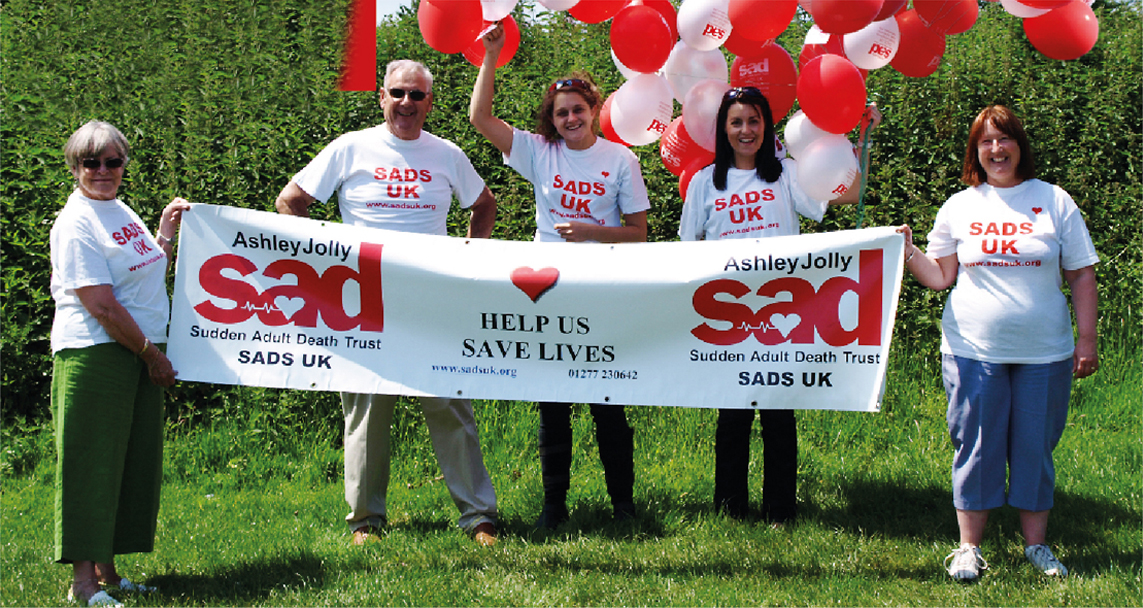Contact SADS UK for details of our SADS memorial candle lighting, Annual Retreat and Stride to STOP SADS
Contact SADS UK for details of our SADS memorial candle lighting, Annual Retreat and Stride to STOP SADS
There are many questions about the Long QT Syndrome, such as:
The Long QT syndrome is an abnormality of the hearts electrical system. The heart muscle is made up of millions of cells, each cell has pores in a membrane termed ion channels, these allow the movement of chemicals in and out of the cells providing the electrical signal generating the heart beat. The long QT syndrome is caused by a disorder of cells that affects the production of the electrical signal. This extends the QT interval which can normally be seen on an ECG trace. The extended QT interval delays the recovery of the heart muscle before the next beat.
The extended QT interval can be associated with arrhythmias causing rapid chaotic heart rhythms that lead to improper pumping of blood with resultant abrupt syncope.
Important - Some medications may prolong the QT interval and must be avoided by people with the Long QT Syndrome. These drugs can also be associated with ‘Drug induced QT Syndrome’.
The LQT Syndrome may be inherited or it may be induced by some medications. The LQT Syndrome is absolutely treatable and treatment saves lives.
More detailed inforation for members of the public More detaied information for medical professionals The long QT syndrome and pregnacySADS UK and the 1st International SADS Conference instrumental in identifying of new gene implicated in causing Sudden Arrhythmic Death Syndrome (SADS)
The 1st International SADS Conference held by SADS UK in 2002 was heralded the first of its kind, bringing together eminent Professors in their specialist areas of cardiology from the UK and overseas, together with medical professionals, genetic researchers and families who were living with cardiac conditions that may cause a potentially fatal cardiac arrhythmia.
SADS UK were thrilled to be contacted by Genetic Researcher, Katherine Timothy from the Howard Hughes Medical Institute to announce an exciting new discovery in the field of genetic research and even more delighted to hear that the conference had been facilitative in bringing this new discovery about.
The genetic cause of a devastating but rare childhood disorder which underlies a form of severe cardiac arrhythmia and syndromic autism had been identified. The Syndrome is to be called Timothy Syndrome in honour of Katherine Timothy’s long and distinguished career as a scientist investigating the causes of cardiac arrhythmias.
‘It was so wonderful that Anne Jolly of SADS UK invited me to the Conference, to participate. Through meeting with families I was able to identify another LQT/syndactyly patient, which was completely remarkable and a great blessing for me and the furthering of our research’
Katherine Timothy, Genetic Researcher, Howard Hughes Medical Institute
‘SADS UK knew that bringing together professionals and families had been valuable and many networks and friendships have been forged from the 1st International SADS Conference. The new discovery this has brought about has really been the ‘icing on the cake’. We greatly admire Katherine Timothy’s dedication and congratulate Katherine and the Howard Hughes Medical Institute in this wonderful new discovery’
Anne Jolly, Chair, SADS UK
SADS UK is dedicated to helping those who have been impacted by cardiac arrhythmia, providing support and information to those affected. Recently they held a conference in conjunction with the Oxford Genetics Knowledge Park. SADS UK were instrumental in the successful Arrhythmia Awareness Campaign that helped lead to an extension to the NSF to include arrhythmias and sudden cardiac death. They have been invited onto a panel of experts to help write this chapter.
HOWARD HUGHES MEDICAL INSTITUTE ARTICLEJust enter your details below

Thank you for considering donation to SADS UK.
There are several methods by which we can accept donations.
FIND OUT MORE HERE